Sarah Polley Just Wants Everyone to Talk More (A Lot More)
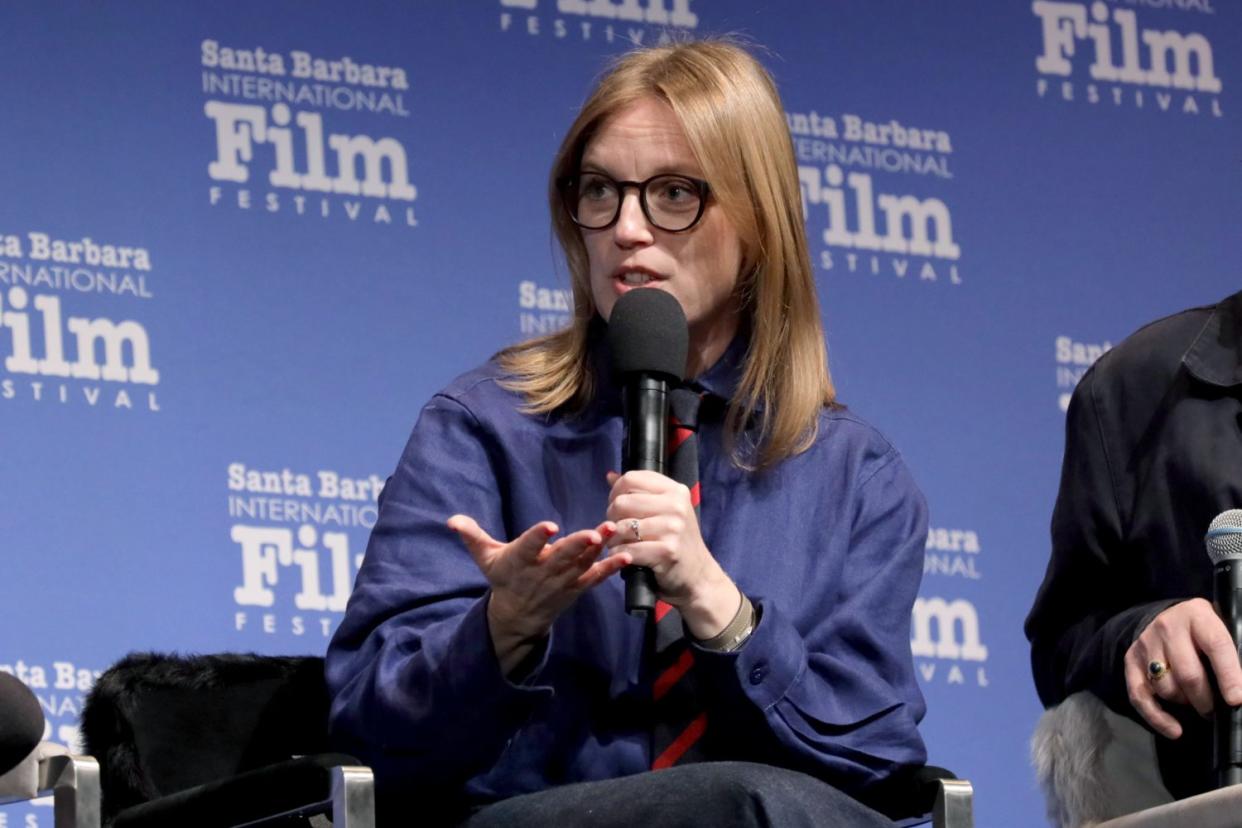
- Oops!Something went wrong.Please try again later.
- Oops!Something went wrong.Please try again later.
There is a utopian dream at the heart of Sarah Polley’s Best Picture nominee “Women Talking.” It’s right there in the title, sort of.
“The most exciting thing are the reports I’m getting about people having to be kicked out of the theater because a bunch of strangers talk to each other,” Polley told IndieWire during a recent interview when asked about the responses to the film she’s enjoyed the most. “It’s literally the utopian dream for me, that this film would make people talk to each other who either didn’t know each other or didn’t agree on things.”
More from IndieWire
Not just women talking, people talking. But, yes, she does realize that the film’s title — the same title of as the Miriam Toews novel that Polley adapted for the screen; her screenplay is also nominated for an Oscar — might sound a little confrontational.
“In a way, I think we left the title the way it is as a kind of challenge,” she said. “There used to be a line in the film where Judith Ivey’s character is asked by a man at some point, ‘What are you doing here? Are you trying to burn down my barn?,’ and Judith Ivey’s character goes, ‘Oh, don’t worry, we’re only women talking.’ So the title actually had this reference to something in the film, and once that wasn’t in the film, I was like, ‘Maybe we should talk about the title,’ and then [producer] Dede [Gardner] was like, ‘Hell no.'”
That’s not going to stop you, right? It hasn’t stopped audiences from seeing the film, which premiered at Telluride in September, hit limited screens in December, and continues to play around the country.
“It is throwing down the gauntlet: Are you really not going to see this movie because it’s called ‘Women Talking’?,” Polley said. “I have found there’s very little difference in terms of the responses from people of different genders. I have found incredibly emotional responses and really vibrant conversations coming from men, young men. There’s such a generosity and openness in so many of the young men I’ve talked to afterwards, which gives you a real hope and faith in the future, which is a nice feeling.”
Before getting to those discussions, however, Polley had to engage in her own conversations — with her characters. Polley started working on the script in 2020, taking Toews’ novel, which follows a group of Mennonite women as they debate the future of their colony after the revelation that many of its men have been drugging and raping the female contingent, and attempting to turn it into a rich ensemble piece for the big screen.
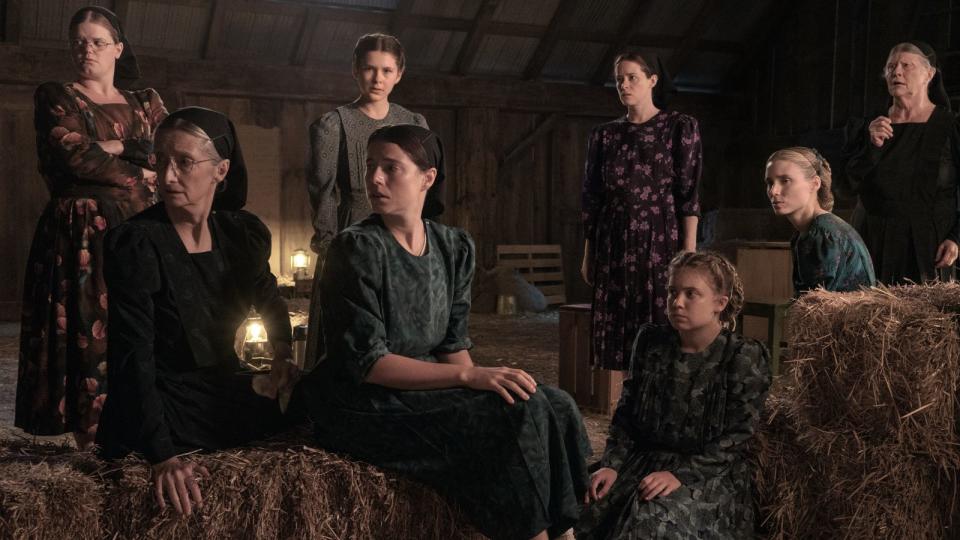
ORION PICTURES RELEASING LLC. All Rights
“Always when you’re beginning something, there’s a sense of being daunted,” Polley said. “It’s also really joyful when you’re adapting something because you’re starting, hopefully, with material you love. You’re getting an opportunity to walk around inside a book that you love and get to know its nooks and crannies and uncover things you didn’t see before.”
And Polley, who hadn’t written or directed a film since her 2012 “Stories We Tell,” was determined to go as deep as possible. To get to know her characters, inside and out, she reworked the script over and over, each time approaching it from the perspective of one of the women (and the sole man) who populates the story.
“I had to do it at least twice, in some cases for some characters, three times, where I would just write a draft imagining they were the only main character in the film,” she said. “Looking at how everything that happened impacted them and how they were hearing everything that was being said, so that even if there was a scene in which they weren’t particularly active, they might be utterly transformed or at least shifted by something that was being said on the other side of the room between two other people.”
Polley found the exercise important not just in the scripting stage, but also when she was on set with her ensemble. Because of it, she “was prepared to answer actors’ questions, because that person sitting on the other side of the room is going to ask me or wonder about how this is impacting them,” she said. “I felt like I needed to have actually inhabited each one of them to just be able to do due diligence.”
The process opened up all sorts of “nooks and crannies” for specific characters, Polley said, like the angry Mariche, played by Jessie Buckley. “She’s the most adversarial in so many ways, so [I needed] to track for her what we find out about her by the end and what she’s been carrying and the fact that she’s been living with domestic violence and there’s been this complicity from the community and even participation in the act of forgiving this person over and over again,” Polley said. “To figure out where she ends up, I [needed to] know that that’s in her from the beginning and track the character with that knowledge from the beginning.”
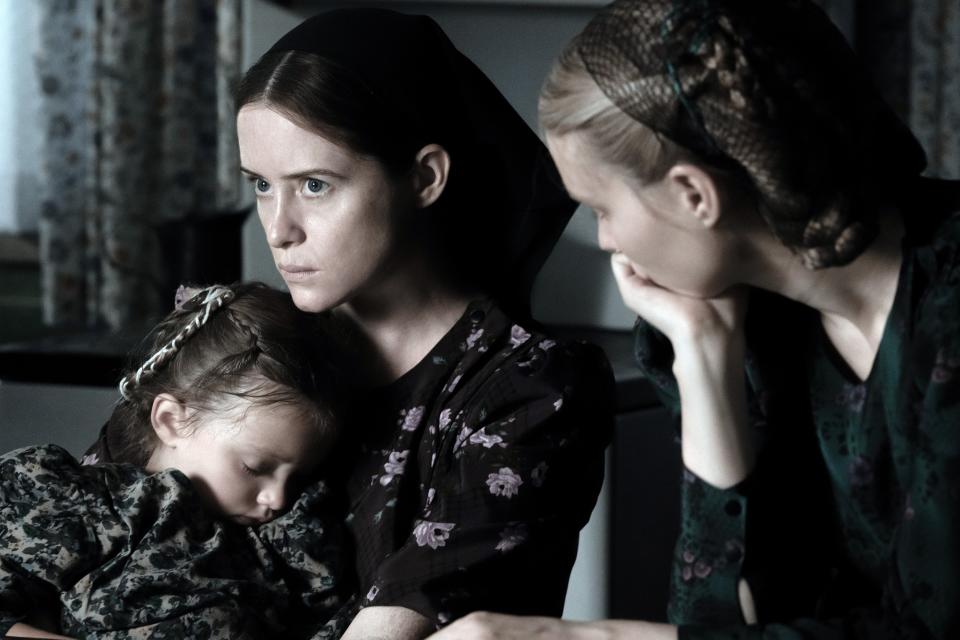
©Orion Pictures Corp/Courtesy Everett Collection
The filmmaker also found more to Mejal, played by Michelle McLeod, through her scripting. “There’s so many valid responses to this kind of violence,” Polley said. “Hers is one of paralysis in a way and falling apart and dissociating. So tracking how the conversation was impacting her leading up to that moment where she does have that PTSD episode and she blacks out, and figuring out how the conversation has led her there, was really important.”
But as well as Polley knew her characters on the page, she resisted imagining what they might look like in the flesh. For “Women Talking,” the filmmaker said, she didn’t allow herself to picture certain performers in certain roles. “I have sometimes in the past, but not always,” she said. “With this film, it was a blank slate. I couldn’t see these people until I found them. And then I rewrote the script once I knew who was playing the parts, but it was a real process of discovery.”
That discovery took many shapes, even down to switching out some performers for different roles along the way. Polley originally met with actress Claire Foy for the part of Ona, who was eventually played by Rooney Mara. But, “halfway through the Zoom call with her,” Foy made a passing reference to the character of Salome that captivated Polley.
“I just saw this little spark in her eye and I suddenly went, ‘Are you more attracted to Salome?,'” Polley recalled. “There is something in Claire, it was really interesting to get to see her express it through the character of Salome, because I hadn’t seen her do it as an actor. I think that’s the most exciting thing when you’re casting, is not thinking of what you know a person can do, but what have they not had the opportunity to do and what would they be amazing at? What would they be excited to try? What’s the challenge for them? What’s the excitement for them?”
Maybe it’s in her blood — both her mother and her brother are casting directors. “Growing up around those conversations around casting, for them, it was always, what’s the idea you have in the middle of the night that won’t make sense to anybody at first, but that’ll really work? Where’s the magic of the combination of actor and part that’s unpredictable?” Polley said. “That’s a really fun way of working, and it involves some risk-taking and far more excitement for the actor.”

Getty Images
In tackling such tough material, Polley — herself a former actress who first appeared on screen at the tender age of four — knew the only way to really bring her characters to life was in a welcoming, safe environment. She knew her story and her characters, loved them, but also wanted everyone — both cast and crew — to feel empowered to add their own insights as the film was taking shape.
“We discovered stuff in the rehearsal process, there would be things that would feel right or wouldn’t feel right or words we realized we could drop or lines we realized we could drop or something that was missing,” she said. “The script felt like a very alive document and an ever-evolving one that also encompassed the experiences of a lot of people on set.”
Polley also made it a point to plot a daily schedule that didn’t involve shooting for all hours, the kind of set where people could actually see their kids at the end of the day, have some time to decompress, not constantly feel pushed to do and feel more.
“I have always hated the emergency room mentality of film sets, it’s so absurd to me,” she said. “I have family members who are medical professionals and they don’t have the same amount of time pressure at work when they’re saving lives as we put on ourselves on film sets. So one of the policies was, if anyone needs a break at any time, we just take one. This is hard. Stuff might come up for crew and for cast. It never, ever hurt the production. I think, in the end, we broke two, maybe three times for the whole shoot. It was great and everyone got a breather and everyone came back and there was more energy and a sense that it was OK to have a moment and people had your back.”
Polley also provided a therapist — Dr. Lori Haskell, an expert on “what trauma does to memory and to the brain” — who helped navigate the material and would be on hand during more difficult scenes and was always available via the phone. “It wasn’t perfect, I’m sure there’s lots of stories about ways in which we got it wrong that I could even tell myself,” Polley said. “But we felt like we were moving it forward a little bit, this conversation about what good working conditions might look like on a film set. Coming from the background of being an actor and many times feeling unsafe or unseen or cared for on set, this was a tremendously useful experience personally too.”
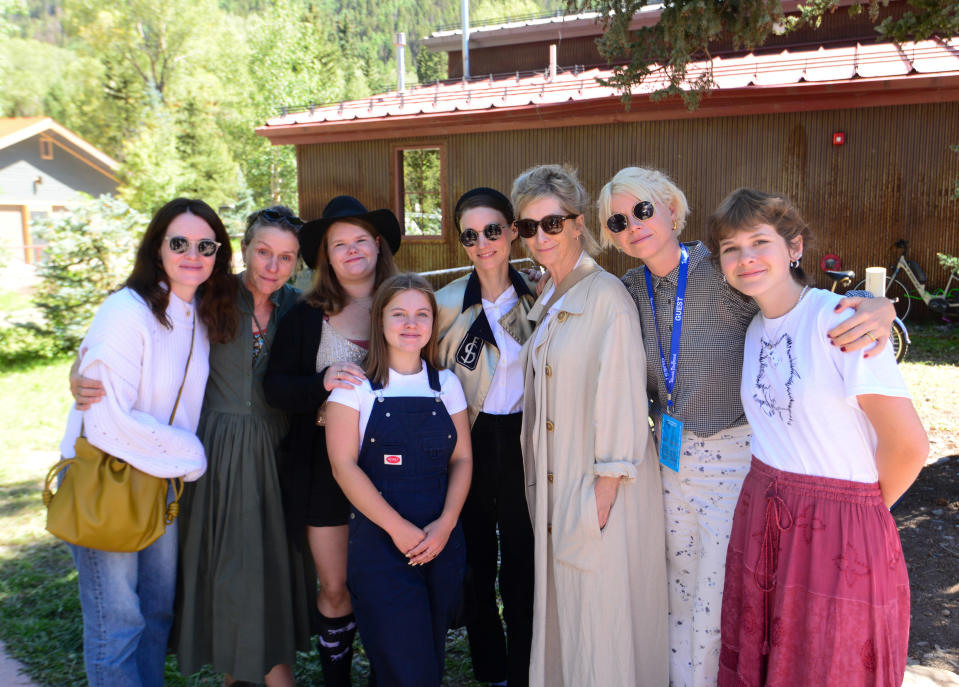
Getty Images
Polley has often written and spoken about those “unsafe” and “unseen” moments in her life and career. In March 2022, the frequent essayist released her first book, “Run Towards the Danger,” which included numerous details about some of the more shocking moments she experienced as a young actor. When asked how she weighs how and what she shares for an audience — both in her book and on the big screen — Polley considered the answer.
“I think I want to know that whatever I’m sharing has a purpose, a practical, tangible purpose,” she said. “So the stories in my book, for instance, I write in it, ‘These are some of the most dangerous stories of my life,’ which isn’t to say they’re all of the most dangerous stories of my life or even the most dangerous stories of my life. I think there are certain things that have happened to me or traumas that I don’t know what the purpose yet is of sharing those. In terms of my book or what I share about my experiences on set as a young actor, it’s about finding a different way forward. They’re all stories of recoveries.”
For now, Polley isn’t too worried about recovering from the wildness of awards season, which has taken her from festival to festival (Telluride to TIFF, New York, and London) and awards show to awards show (in addition to the two Oscar noms, the film is also up for three Indie Spirits, plus the SAG ensemble award; Polley recently won the Critics Choice Award for her script, in addition to a Palm Springs win for Director of the Year, and that’s just a sample of the film’s many accolades).
“I’ve definitely had a couple of times where I hit a wall, but mostly I’m enjoying it, I think because I don’t do it ever,” Polley said with a laugh. “There are people who do this all the time and they’re so tired. But I’m still getting used to the fact that every day I’m in a room with interesting people who I’m really excited to talk to, and they’re adults and there’s usually OK food.”
During the season, Polley has been particularly outspoken about the other female filmmakers who have films in the awards race, including Gina Prince-Bythewood, Maria Schrader, Chinonye Chukwu, and Charlotte Wells. When asked why she felt it was important to champion them, the answer was easy: because she’s seen what this process is like, from the inside.
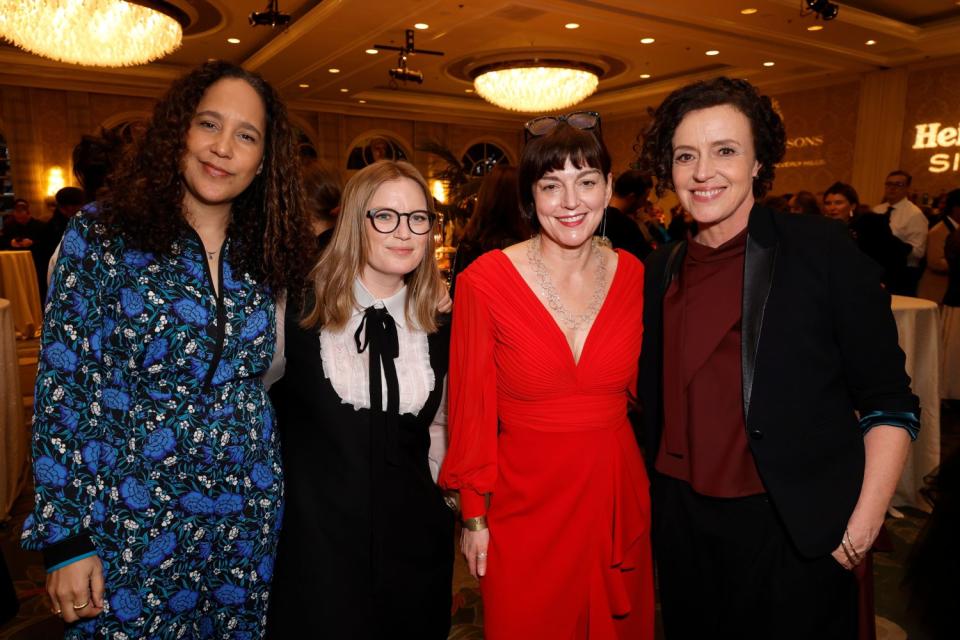
Getty Images for BAFTA
“I was watching this all happen in real-time, the way they were doing all the same stuff we were,” Polley said. “Spending quite a bit of time with ‘The Woman King’ crew and the ‘Till’ crew and just seeing it through their eyes was really something else. You kind of have to be there, but watching how rigged the game is is a surprise to no one who’s been living this for their whole life, but still just deeply disappointing and devastating. It was just really sobering to see how those films weren’t recognized.”
Along the way, she’s formed a strong bond with Prince-Bythewood, as the pair have made a point to reject the outdated notion that there’s only room for one female director in the Best Picture race. “Everyone said, there’s going to be one slot for a female filmmaker here, and we were like, ‘Well, we’re not in competition with each other. There should just be more slots,'” Polley said. “We really did a lot of connecting. She’s been a mentor to me in many ways.”
She added, “You don’t want to put too much emphasis on awards, but at the same time, I’m experiencing right now the difference that it makes. Us getting a Best Picture nomination has had a huge impact on the way people talk about our film, on the number of people who go to see our film, how seriously our film is being taken.” Polley just wants that same consideration to be possible for all films, including “The Woman King” and “Till,” two achievements she can’t say enough good stuff about.
So, what’s next after the mad dash of Oscar season ends? Polley is back to work, and she promises (well, she at least hopes, she’s the last person to say something without being able to fully back it up) a new film won’t take a decade. But she’s not looking to shake this experience, but to process the joys of it and take all that into whatever comes next.
“I love writing, so I’m writing a novel and I’m interested in writing another film, but I think I’m going to be focused on writing for a little bit,” Polley said. “I’m never in a huge hurry to make a film, but I hope it won’t be another 10 years. In fact, I’m sure it won’t be. I mean, knock wood it won’t be! And also just processing. This has been an amazing experience. To get to be in these rooms in the last six months, I’ve been able to meet some of the most interesting minds and people that I’ve met in my life, I’ve just gleaned a lot from it, so to just go away and be able to process that is a real gift.”
It seems that Polley isn’t done with that utopian dream: people talking, about everything, together.
“Women Talking” is now available in select theaters and on various digital platforms.
Best of IndieWire
Sign up for Indiewire's Newsletter. For the latest news, follow us on Facebook, Twitter, and Instagram.


